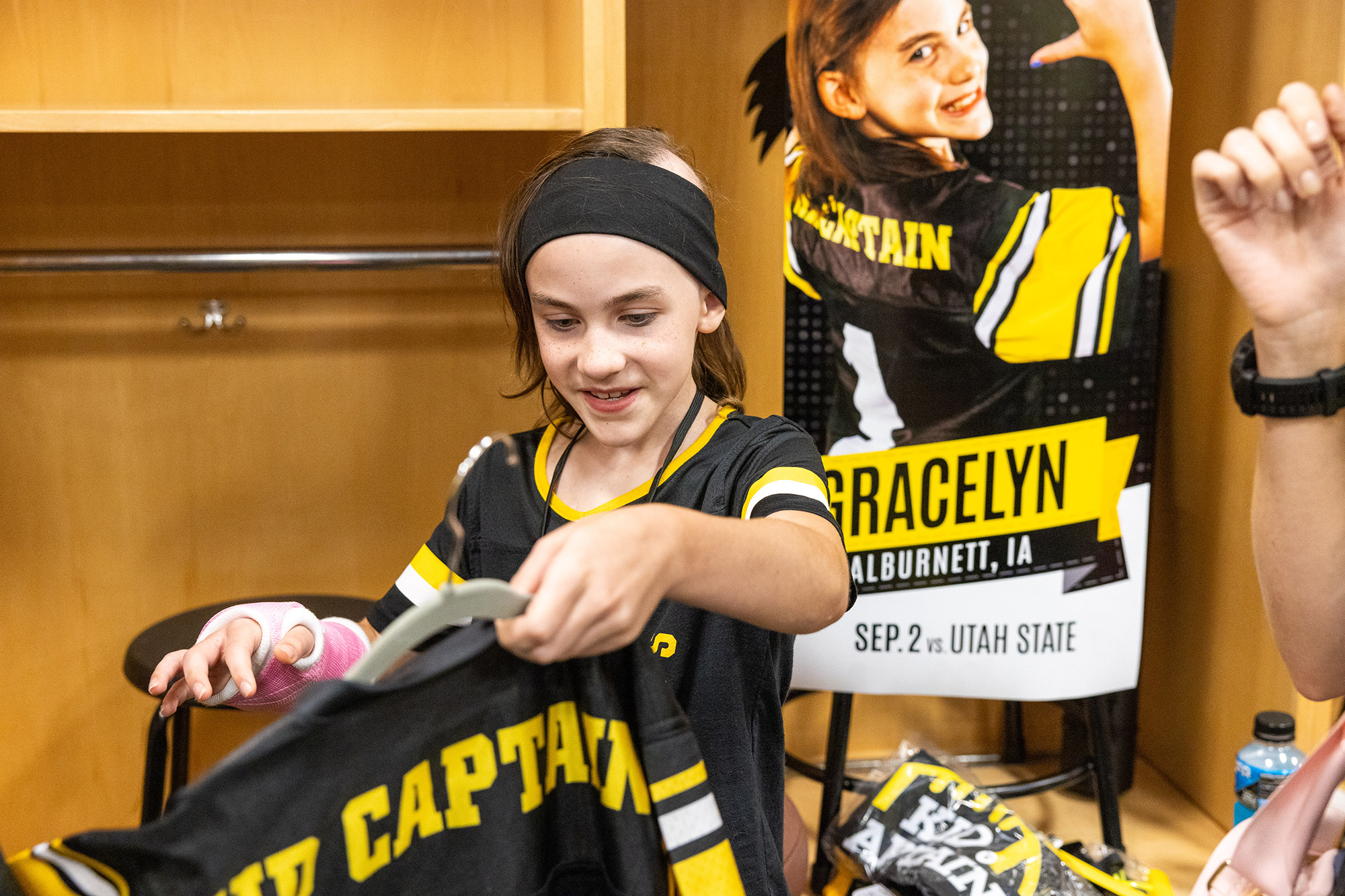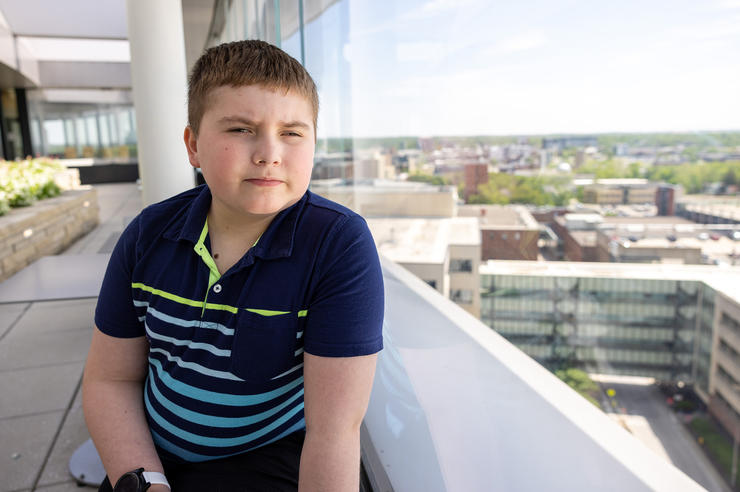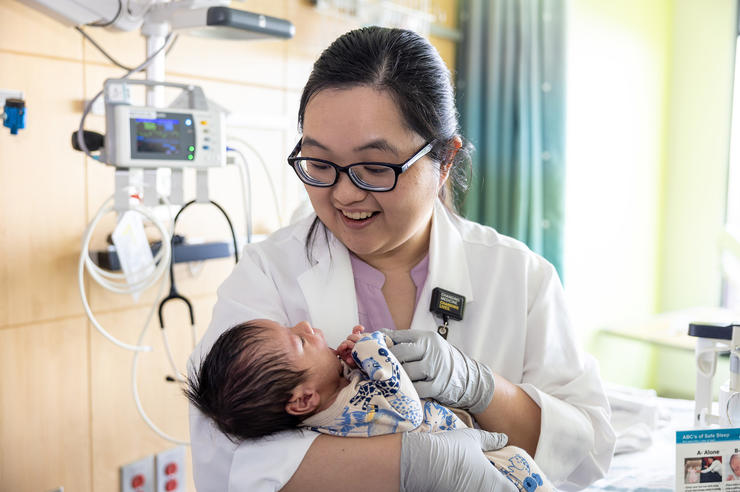Meet Kid Captain Gracelyn Springer

At 8 years old, Gracelyn Springer, of Alburnett, Iowa, began experiencing headache and nausea when she would wake. These instances were infrequent at first—maybe once a week—but the frequency and severity both would increase over time.
“It got to the point where it was almost every day, and she was vomiting, not just nauseous,” says her mother, Kelsey.
Gracelyn’s parents also noticed her left eye would “deviate” to the center, and she showed sensitivity to sound at school.
“It was about six to eight weeks before we finally got an answer,” Kelsey says.
That answer was a diagnosis of Ewing sarcoma, a cancer that typically occurs in leg bones or soft tissue of the chest, abdomen, and limbs.
In Gracelyn’s case, doctors discovered the tumor in her head.

University of Iowa Stead Family Children’s Hospital is Iowa’s only nationally ranked children’s hospital, offering all pediatric subspecialties and caring for kids from all 99 counties in Iowa. We provide world-class pediatric care that families trust—and kids deserve.
‘This wasn’t normal’
Kelsey had taken Gracelyn to her pediatrician, but nothing came back abnormal with her blood work and they were sent home.
On Nov. 14, 2020, Gracelyn once again woke up with a headache and began vomiting, but this time she couldn’t stop vomiting. “I had had enough,” Kelsey says. “There was something seriously wrong with our daughter. This wasn’t normal.”
Kelsey rushed Gracelyn to their local emergency room to find an answer.
“They took her back for a CT; five minutes later, they came into our room and I could tell immediately by looking at their faces that it was serious,” Kelsey recalls. “The doctor looked at me and said, ‘We found a mass in her brain,’ and I passed out.”
Gracelyn was transferred immediately to University of Iowa Stead Family Children’s Hospital.
“Once we got here, they did an MRI and saw the mass,” Kelsey says. “They brought her up to the Pediatric Intensive Care Unit and that’s when the flood of doctors started coming in.”
Providing compassionate, expert care
Gracelyn was scheduled the following Monday for a craniotomy, a type of brain surgery that involves removing part of the skull.
Although COVID-19 visitor restrictions were in place at the time, Gracelyn’s father, Marty, was given special permission to visit, “just in case surgery didn’t go well,” Kelsey says. “That was everything to us in that moment. She needed her daddy, and her daddy needed her, so the understanding and compassion of the team to allow him to be there started off our whole experience in the right way.”
Gracelyn’s care team told the couple they would have to shave half of her head for surgery and asked if they wanted to do it.
“We just shaved her entire head because she didn’t want it half shaved,” Kelsey says. “It was excruciatingly painful emotionally. Her hair was her favorite part of herself. It was super long and gorgeous.”
The tumor had originated in her mastoid bone, behind the ear, growing internally toward the young girl’s brain. The craniotomy to remove the tumor took between eight and 10 hours and went as well as one could hope.
“They prepared us for a lot of scary side effects: potential loss of speech, loss of sight. She had none of that,” Kelsey says. “They removed the entire tumor and she came away with no deficits.”
“They listen to us and her, they respect us and her, they care for our whole family, they advocate for her, they fight for her, they work hard, they are always researching and trying to improve. We have so much to worry about as parents of a child with cancer, but her medical team is not one of them.”
Gracelyn is the ‘1% of the 1%’
By week’s end, the family received news from the biopsy: Ewing sarcoma. Kelsey was familiar with Ewing sarcoma—the boyfriend of a high school classmate had been diagnosed with the same cancer—but Gracelyn’s father had never heard of it.
“Before all of this, he had the idea that all cancer is cancer and you just treat it,” Kelsey says. “We both discovered cancer is very individual and unique to each person and the treatment looks a lot different. This is a solid tumor in the bone or soft tissue and it only accounts for 1% of all childhood cancers. Gracelyn’s cancer is even rarer.”
Kelsey says that since it was identified, there have only been 40 cases of Ewing sarcoma in the skull.
“A parent’s greatest fear is losing their child,” Kelsey says. “The fear became much more real and plausible after Gracelyn was diagnosed. She is 1% of 1%: only 1% of all childhood cancer diagnoses are Ewing sarcoma, and of those that are diagnosed with Ewing, only 1% have a tumor that grows in the head or skull.”

Gracelyn was put on a chemotherapy regimen so intense that “the hospital was our home away from home,” Kelsey recalls. Gracelyn was an inpatient every other week for 14 rounds, but she also was sick on her off-weeks, so they stayed at the hospital every week for nine months, with the occasional day or two at home.
“Because Ewing is very aggressive, you have to hit it really hard,” Kelsey says.
Gracelyn also underwent 30 rounds of radiation at another hospital because the specific type wasn’t offered at UI Stead Family Children’s Hospital, but all of her other care is in Iowa City.
Gracelyn’s pituitary gland was damaged permanently due to the tumor, resulting in growth hormone deficiency, and she is now on growth hormone treatment, a daily shot for the next five to six years until she is done growing.
At University of Iowa Stead Family Children’s Hospital, your child is treated by a specialist who is an expert in your child’s specific type of cancer, with access to the best treatments, including clinical trials of promising new therapies not yet widely available. And every member of our staff is specially trained to care for children, offering support, compassion, and hope to kids and their families, every step of the way.
The radiation caused other issues, including permanent hair loss on the left side of her head. “That is a source of struggle for her,” Kelsey says.
She also suffered from hearing loss and was diagnosed with cardiomyopathy, a disease that makes it harder for the heart to deliver blood to the body.
Praise for the care team
Gracelyn continues to see specialists at UI Stead Family Children’s Hospital and receives scans every few months.
“Her doctors have never treated anyone like her,” Kelsey says. “That might shake a parent’s confidence in the hospital, but not ours. They listen to us and her, they respect us and her, they care for our whole family, they advocate for her, they fight for her, they work hard, they are always researching and trying to improve. We have so much to worry about as parents of a child with cancer, but her medical team is not one of them.”
Now 10, Gracelyn is in fifth grade and enjoys painting, crafts, singing, and dance. Thankfully, her cancer is considered to be in remission.
“She’s definitely a creative person,” Kelsey noted. “A cancer diagnosis for your child is a life-shattering event, so we truly appreciate all the members of Gracelyn’s team. They all had a unique role that was crucial to her survival. They take the time to answer all my questions and they respect my opinions. We would not trust any other place but Stead with our daughter’s health and future. They saved our child’s life.”


